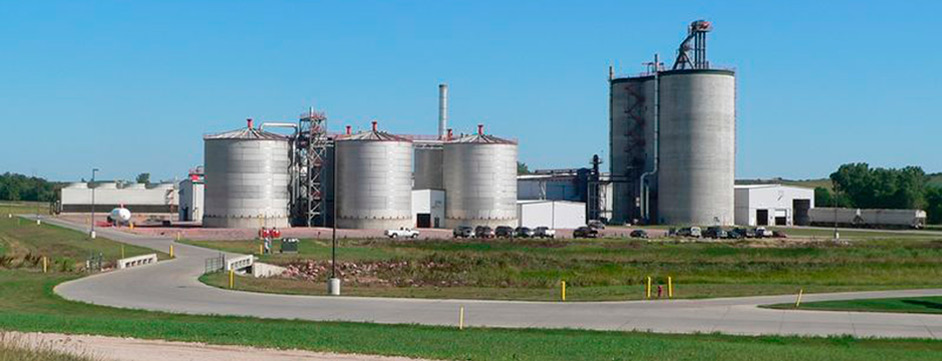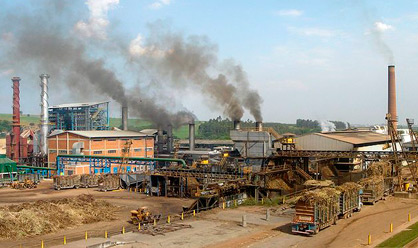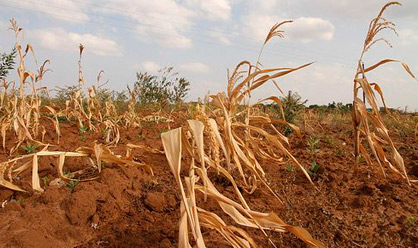Shadows in a green business

Photo by Ammodramus. Courtesy of commons.wikimedia.org
The "ethanol Czars" are a new generation of business executives who lead an industry dependent on subsidies, lobbying and very favorable loans awarded by multilateral organizations.
With 87 percent of the global market, ethanol companies in the United States and Brazil have control over the production of this biofuel, while other South American firms, mainly in Colombia and Peru, are trying to duplicate the giants' recipe for success.
Even though this industry managed to double its production in five years, it has begun to experience some tough adjustments. On the one hand, it has experienced inferior economic results in 2012 compared to previous years. On the other, the environmentalists that once endorsed the industry have become more critical and are asking how sustainable this industry really is and what contribution, if any, it's making to the environment.
With 87 percent of the global market, ethanol companies in the United States and Brazil have control over the production of this biofuel, while other South American firms, mainly in Colombia and Peru, are trying to duplicate the giants' recipe for success.
Even though this industry managed to double its production in five years, it has begun to experience some tough adjustments. On the one hand, it has experienced inferior economic results in 2012 compared to previous years. On the other, the environmentalists that once endorsed the industry have become more critical and are asking how sustainable this industry really is and what contribution, if any, it's making to the environment.
In response to this economic crisis and dwindling support from environmentalists, the lobbying efforts of the ethanol industry in the halls of power in Washington have grown almost as intense as the work required to obtain the raw material of this biofuel.
An investigation by the New England Center for Investigative Reporting and Connectas into the ethanol industry's lobbying has found that over the last five years the industry -its companies and associations- has spent around $30 million a year for a total of approximately $150 million between 2008 and 2012. That's 10 million more a year than the amount spent in the previous five years, all in an effort to influence the U.S. Congress and Senate.
The industry's primary goal is ensuring the survival of the Renewable Fuels Standard that guarantees that a minimum percentage of ethanol and other biofuels be blended with gasoline each year. The U.S. industry also lobbied for the Volumetric Ethanol Excise Tax Credit, a tax incentive of $0.45 cents for every gallon of ethanol that was blended in gasoline until 2011.
Since 2000, at least 5,980 firms reported lobbying for ethanol, according to records obtained from the Center for Responsive Politics and processed by the Computer Science and Artificial Intelligence Laboratory at the Massachusetts Institute of Technology (MIT). Among these firms-- the biggest players lobbying for the ethanol industry-- are at least 16 companies that produce the biofuel and 21 associations that have among its members firms connected to the ethanol industry.

 According to the Renewable Fuels Association, that represents the U.S. ethanol industry, the global production of ethanol almost doubled over a five-year period, from 13 billion gallons in 2007 to 22 billion gallons in 2011. However, some specialists question the future prospects of this business because it is excessively dependent on the policies of the United States that is the main ethanol producer in the world. Together with Brazil they produce 87 percent of the global market.
According to the Renewable Fuels Association, that represents the U.S. ethanol industry, the global production of ethanol almost doubled over a five-year period, from 13 billion gallons in 2007 to 22 billion gallons in 2011. However, some specialists question the future prospects of this business because it is excessively dependent on the policies of the United States that is the main ethanol producer in the world. Together with Brazil they produce 87 percent of the global market.
Propping up the industry in the Americas are regulations that mandate blending ethanol with gasoline: the United States requires a combination of at least ten percent of ethanol; Brazil 25 percent; Colombia 8 percent and Peru 7.8 percent.
"Biofuel mandates are good examples of politics but are not good policies", says Professor Robert Lawrence of the Harvard Kennedy School of Government, who specializes in international trade and investment. For Lawrence, the main beneficiaries of these mandates are the American farmers, not the consumers or the environment. Those farmers produce the corn from which ethanol is made.
Bliss Baker from the Global Renewable Fuels Alliance, an international association that represents over sixty percent of the world's renewable fuels producers, argues that the ethanol is alive and dismisses the existent criticism due to the large amount of subsidies the industry receives: "The Volumetric Ethanol Excise Tax Credit (VEETC) expired –in the United States- a year ago and the sky did not fall on us. Plus, there isn't an energy source on the planet that doesn't receive some sort of government support," Baker said.
The history of laws passed in the United States and Brazil to promote the ethanol industry dates back to the 1970's when there was an oil crisis, the first celebration of Global Earth Day and an attempt to generate an environmental agenda. Around this time, the United States started producing gasohol in Nebraska (a combination of gas and ethanol). Gasohol production required an investment of public funds because the business was not sustainable on its own and had been abandoned since the forties.
In 1975, Brazil began its flagship program: Proálcool. Its goal is to try to reduce dependency on fossil fuels, which according to BP Statistical Review make up 87 percent of today's global energy market. But now environmentalists have started to question how beneficial biofuels are for the environment.
"The ethanol lobbying is very aggressive" says Craig Cox from the Environmental Working Group, an organization that promotes public health and environmental protection and opposes policies in favor of the biofuel. "The ethanol industry is spending millions of dollars on lobbying. They are hiring high powered lobbyists and they've created organizations to promote corn ethanol and expand the use of the biofuel," Cox said.
The now-expired Volumetric Ethanol Excise Tax Credit (VEETC), in the US, cost the American people around six billion dollars in 2011, according to the United States Government Accountability Office. These types of policies and the mandate that enforces the use of a minimum amount of ethanol mixed into fossil fuels raise concerns among competitors from other countries. This is the case for the European Union, the world's third largest ethanol producer. In December 2012, the EU proposed to increase taxes on ethanol imported from the United States in an effort to control dumping or U.S. ethanol having a price advantage in the market as a result of subsidies. Until 2011 the United States had a similar measure on imported ethanol that directly impacted Brazil.
The ethanol industry has tried to hold on to these policies through lobbying as records show and some lobbyists have explained. The industry's influence in the political arena stems, in part, from the power of the corn industry in the United States and the sugarcane Czars in Latin America. Corn and sugarcane are the main raw materials of this biofuel in each region.
The industry's attempt to influence the powerful extends beyond Washington. It is also trying to wield influence in Latin America's political arena. In Brazil and Colombia, the main ethanol producing companies also regularly contribute to local political campaigns, according to records of the Supreme Electoral Tribunal in Brazil and the database of Consejo de Redacción, a journalist’s organization in Colombia.

 To sustain itself in Latin America the industry has sought out soft loans (long term loans with low interest rates). These are financed by the World Bank, the Inter-American Development Bank and the Latin American Development Bank CAF. Since 2005, those loans have added up to more than $1.4 billion.
To sustain itself in Latin America the industry has sought out soft loans (long term loans with low interest rates). These are financed by the World Bank, the Inter-American Development Bank and the Latin American Development Bank CAF. Since 2005, those loans have added up to more than $1.4 billion.
In the region, Colombia is the second largest ethanol producer, despite a very strong sugar industry in Central America. However, there is quite a gap among the main players: while Brazil has over 300 ethanol plants, Colombia has six and Peru is trying to be a part of the league with just two.
"The experience of Brazil and the United States in developing their ethanol industry through policies as the creation of a standard for different types of blends between ethanol and gasoline is a good example for Colombia. The challenge is to expand the industry partly through all the potential the domestic market has. For that we will need support of the State", says Johan Martinez from the Colombian sugarcane association Asocaña. This means that for these new markets it is important to copy the success formula of the biggest ethanol producers, the same formula that is today in question.
Tough times
The ethanol market makes up 82 percent of the biofuel market. Despite the industry's growth in the last few years, in 2012 it decelerated.
"Sugar prices vary widely. When they increase, the ethanol production decreases. So the companies decided to bet on the high costs of sugar two years ago. There was an ethanol production crisis and that caused the reduction of the blend between ethanol and gasoline from 25 percent to 20 per cent in Brazil", explains Luiz Antonio Lemos, the Brazilian lawyer who specializes in business law as it relates to energy and infrastructure industries. Other factors contributing to the ethanol production decline were the low price of gasoline in Brazil and climate conditions.
At the same time, imports went from 21 million to 383 million gallons, according to the Brazilian Sugarcane Industry Association (União da Indústria de Cana-de-Açúcar – Unica).
For 2013 it has been announced that since May the blend will go back up to 25 percent and it is expected that this will cause an increase of gasoline prices. Due to this and a decline in sugar prices, Unica foresees an increase in Brazilian ethanol production. The other key factor that could affect their projections will be weather conditions.
In the United States, the 2012 drought –classified by the National Climatic Data Center as one of the worst in the history of the country– also affected the ethanol industry. While the ethanol production in 2011 in the U.S. was 13.9 billion gallons, in 2012 it decreased to 13.3 billion gallons.
Iowa produces 28 percent of ethanol in the U.S. and for the first time in ten years it didn't increase its production of this biofuel. Instead, it stayed the same as in 2011, according to a statement by Iowa Renewable Fuels Association (IRFA). "In the end we held steady, but everyone is praying for rain and a trend-line corn yield in 2013 to really jumpstart the industry", said Monte Shaw, IRFA director.
Some companies in other states had to go out of business or close their ethanol production plants temporarily and declare losses. This was the case for Valero Energy, one of the main production companies. In June, it had to temporarily close two of its plants in Nebraska and Indiana. In October it reported 73 million dollars in losses during the third quarter of 2012. Other companies of a smaller scale like Central Minnesota Ethanol and Agri-Energy also announced they had to close their refineries.

 "The decrease in ethanol operating income was due to significantly lower gross margins caused by a combination of high corn prices and high industry ethanol inventories attributable to lower ethanol and gasoline demand", explained Valero Energy in its 2012 third quarter report.
"The decrease in ethanol operating income was due to significantly lower gross margins caused by a combination of high corn prices and high industry ethanol inventories attributable to lower ethanol and gasoline demand", explained Valero Energy in its 2012 third quarter report.
Archer Daniels Midland, POET Biorefining and Valero Renewable Fuels are among the main ethanol producers in the United States. In Brazil, Latin America's largest ethanol producer, the biggest companies are: Copersucar, Biosev (Dreyfus), Odebrecht Agroindustrial (ETH Bioenergia) and Raízen (an alliance between Cosan and Shell).
Another problem for the industry – declining support from environmentalists. Many environmentalists have changed sides. For years they had supported this industry as an effective means to combat global warming. Now, they're lobbying to kill or modify laws associated with ethanol production. They are focusing on the production of corn-based ethanol because they no longer believe ethanol's environmental benefits outweigh the negative impact of the fertilizers used to grow the corn.
"We are opposed to any further petrol source or artificially expanded corn ethanol industry. We are skeptical; we are not convinced that advanced biofuels are technically or environmentally a good option", said Craig Cox from the Environmental Working Group.
Various studies of the life-cycle of greenhouse gas emissions indicate that corn ethanol may generate more emissions than sugarcane based ethanol. "Relative to petroleum gasoline, ethanol from corn, sugarcane, corn stover, switchgrass and miscanthus can reduce life-cycle GHG emissions by 19–48 per cent, 40–62 per cent, 90–103 per cent, 77–97 per cent and 101–115 per cent, respectively", indicates a paper in IOPscience, a publication from the London- based Institute of Physics.
"We need better standards for environmental protection and we need electric vehicles. If we can get these sorts of vehicles we wouldn't even need biofuels. We are wasting money on solutions that aren't real", emphasizes Michal Rosenoer who was part of the Friends of the Earth organization.
In Brazil, where sugarcane is ethanol's raw material, the industry has been criticized about the working conditions of its employees, a problem inherited from the sugar industry. To guarantee better conditions, Brazil's Labor Ministry has cited the industry for long working hours, unfavorable climate, the lack of collective bargaining contracts, malnutrition and inadequate lodging according to organizations such as Fundacentro. The World Bank Group has said the situation should improve thanks to the industrialization of the harvest collecting processes.
Investments in energy alternatives are starting to compete with biofuels. Other options, like second-generation ethanol, derived from agricultural residue, wood and other organic sources, is being explored at the same time that the production of electric cars is advancing with giant steps. In its effort to grow, the ethanol industry wants to sell itself as a fuel option for airplanes. By 2015 British Airways plans to use biofuels in its fleet. Together with other European airlines such as Lufthansa and Air France/KLM, they form the European Advanced Biofuels Flight Path Initiative launched to speed up the commercialization of aviation biofuels in Europe.
But uncertainty about ethanol's future remains –in part because of its dependence on government mandates and tax incentives and, in part because of the impact of droughts. That mixture has cast a long dark shadow over the once green business.
An investigation by the New England Center for Investigative Reporting and Connectas into the ethanol industry's lobbying has found that over the last five years the industry -its companies and associations- has spent around $30 million a year for a total of approximately $150 million between 2008 and 2012. That's 10 million more a year than the amount spent in the previous five years, all in an effort to influence the U.S. Congress and Senate.
The industry's primary goal is ensuring the survival of the Renewable Fuels Standard that guarantees that a minimum percentage of ethanol and other biofuels be blended with gasoline each year. The U.S. industry also lobbied for the Volumetric Ethanol Excise Tax Credit, a tax incentive of $0.45 cents for every gallon of ethanol that was blended in gasoline until 2011.
Since 2000, at least 5,980 firms reported lobbying for ethanol, according to records obtained from the Center for Responsive Politics and processed by the Computer Science and Artificial Intelligence Laboratory at the Massachusetts Institute of Technology (MIT). Among these firms-- the biggest players lobbying for the ethanol industry-- are at least 16 companies that produce the biofuel and 21 associations that have among its members firms connected to the ethanol industry.

Photo by Mattes. Courtesy of commons.wikimedia.org
Electric vehicles are an alternative option for the environment.

Photo by John Hill. Courtesy of commons.wikimedia.org
Programs to promote ethanol production in Brazil and the United States were created during the oil crisis in the seventies.
Propping up the industry in the Americas are regulations that mandate blending ethanol with gasoline: the United States requires a combination of at least ten percent of ethanol; Brazil 25 percent; Colombia 8 percent and Peru 7.8 percent.
"Biofuel mandates are good examples of politics but are not good policies", says Professor Robert Lawrence of the Harvard Kennedy School of Government, who specializes in international trade and investment. For Lawrence, the main beneficiaries of these mandates are the American farmers, not the consumers or the environment. Those farmers produce the corn from which ethanol is made.
Bliss Baker from the Global Renewable Fuels Alliance, an international association that represents over sixty percent of the world's renewable fuels producers, argues that the ethanol is alive and dismisses the existent criticism due to the large amount of subsidies the industry receives: "The Volumetric Ethanol Excise Tax Credit (VEETC) expired –in the United States- a year ago and the sky did not fall on us. Plus, there isn't an energy source on the planet that doesn't receive some sort of government support," Baker said.
The history of laws passed in the United States and Brazil to promote the ethanol industry dates back to the 1970's when there was an oil crisis, the first celebration of Global Earth Day and an attempt to generate an environmental agenda. Around this time, the United States started producing gasohol in Nebraska (a combination of gas and ethanol). Gasohol production required an investment of public funds because the business was not sustainable on its own and had been abandoned since the forties.
In 1975, Brazil began its flagship program: Proálcool. Its goal is to try to reduce dependency on fossil fuels, which according to BP Statistical Review make up 87 percent of today's global energy market. But now environmentalists have started to question how beneficial biofuels are for the environment.
"The ethanol lobbying is very aggressive" says Craig Cox from the Environmental Working Group, an organization that promotes public health and environmental protection and opposes policies in favor of the biofuel. "The ethanol industry is spending millions of dollars on lobbying. They are hiring high powered lobbyists and they've created organizations to promote corn ethanol and expand the use of the biofuel," Cox said.
The now-expired Volumetric Ethanol Excise Tax Credit (VEETC), in the US, cost the American people around six billion dollars in 2011, according to the United States Government Accountability Office. These types of policies and the mandate that enforces the use of a minimum amount of ethanol mixed into fossil fuels raise concerns among competitors from other countries. This is the case for the European Union, the world's third largest ethanol producer. In December 2012, the EU proposed to increase taxes on ethanol imported from the United States in an effort to control dumping or U.S. ethanol having a price advantage in the market as a result of subsidies. Until 2011 the United States had a similar measure on imported ethanol that directly impacted Brazil.
The ethanol industry has tried to hold on to these policies through lobbying as records show and some lobbyists have explained. The industry's influence in the political arena stems, in part, from the power of the corn industry in the United States and the sugarcane Czars in Latin America. Corn and sugarcane are the main raw materials of this biofuel in each region.
The industry's attempt to influence the powerful extends beyond Washington. It is also trying to wield influence in Latin America's political arena. In Brazil and Colombia, the main ethanol producing companies also regularly contribute to local political campaigns, according to records of the Supreme Electoral Tribunal in Brazil and the database of Consejo de Redacción, a journalist’s organization in Colombia.

Photo by Mario Roberto Duran Ortiz. Courtesy of commons.wikimedia.org
Brazil has over 300 ethanol-producing plants.

Photo by João Henrique Rosa. Courtesy of commons.wikimedia.org
Brazil has investigated the working conditions of sugarcane collectors. Sugarcane is ethanol's raw material.
In the region, Colombia is the second largest ethanol producer, despite a very strong sugar industry in Central America. However, there is quite a gap among the main players: while Brazil has over 300 ethanol plants, Colombia has six and Peru is trying to be a part of the league with just two.
"The experience of Brazil and the United States in developing their ethanol industry through policies as the creation of a standard for different types of blends between ethanol and gasoline is a good example for Colombia. The challenge is to expand the industry partly through all the potential the domestic market has. For that we will need support of the State", says Johan Martinez from the Colombian sugarcane association Asocaña. This means that for these new markets it is important to copy the success formula of the biggest ethanol producers, the same formula that is today in question.
Tough times
The ethanol market makes up 82 percent of the biofuel market. Despite the industry's growth in the last few years, in 2012 it decelerated.
"Sugar prices vary widely. When they increase, the ethanol production decreases. So the companies decided to bet on the high costs of sugar two years ago. There was an ethanol production crisis and that caused the reduction of the blend between ethanol and gasoline from 25 percent to 20 per cent in Brazil", explains Luiz Antonio Lemos, the Brazilian lawyer who specializes in business law as it relates to energy and infrastructure industries. Other factors contributing to the ethanol production decline were the low price of gasoline in Brazil and climate conditions.
At the same time, imports went from 21 million to 383 million gallons, according to the Brazilian Sugarcane Industry Association (União da Indústria de Cana-de-Açúcar – Unica).
For 2013 it has been announced that since May the blend will go back up to 25 percent and it is expected that this will cause an increase of gasoline prices. Due to this and a decline in sugar prices, Unica foresees an increase in Brazilian ethanol production. The other key factor that could affect their projections will be weather conditions.
In the United States, the 2012 drought –classified by the National Climatic Data Center as one of the worst in the history of the country– also affected the ethanol industry. While the ethanol production in 2011 in the U.S. was 13.9 billion gallons, in 2012 it decreased to 13.3 billion gallons.
Iowa produces 28 percent of ethanol in the U.S. and for the first time in ten years it didn't increase its production of this biofuel. Instead, it stayed the same as in 2011, according to a statement by Iowa Renewable Fuels Association (IRFA). "In the end we held steady, but everyone is praying for rain and a trend-line corn yield in 2013 to really jumpstart the industry", said Monte Shaw, IRFA director.
Some companies in other states had to go out of business or close their ethanol production plants temporarily and declare losses. This was the case for Valero Energy, one of the main production companies. In June, it had to temporarily close two of its plants in Nebraska and Indiana. In October it reported 73 million dollars in losses during the third quarter of 2012. Other companies of a smaller scale like Central Minnesota Ethanol and Agri-Energy also announced they had to close their refineries.

Photo by SamenwerkendeHulporganisaties. Courtesy of flickr.com/creativecommons
The 2012 drought in the United States affected the ethanol production.

Photo by Luis Argerich. Courtesy of commons.wikimedia.org
By 2015 British Airways plans to use biofuels in its fleet.
Archer Daniels Midland, POET Biorefining and Valero Renewable Fuels are among the main ethanol producers in the United States. In Brazil, Latin America's largest ethanol producer, the biggest companies are: Copersucar, Biosev (Dreyfus), Odebrecht Agroindustrial (ETH Bioenergia) and Raízen (an alliance between Cosan and Shell).
Another problem for the industry – declining support from environmentalists. Many environmentalists have changed sides. For years they had supported this industry as an effective means to combat global warming. Now, they're lobbying to kill or modify laws associated with ethanol production. They are focusing on the production of corn-based ethanol because they no longer believe ethanol's environmental benefits outweigh the negative impact of the fertilizers used to grow the corn.
"We are opposed to any further petrol source or artificially expanded corn ethanol industry. We are skeptical; we are not convinced that advanced biofuels are technically or environmentally a good option", said Craig Cox from the Environmental Working Group.
Various studies of the life-cycle of greenhouse gas emissions indicate that corn ethanol may generate more emissions than sugarcane based ethanol. "Relative to petroleum gasoline, ethanol from corn, sugarcane, corn stover, switchgrass and miscanthus can reduce life-cycle GHG emissions by 19–48 per cent, 40–62 per cent, 90–103 per cent, 77–97 per cent and 101–115 per cent, respectively", indicates a paper in IOPscience, a publication from the London- based Institute of Physics.
"We need better standards for environmental protection and we need electric vehicles. If we can get these sorts of vehicles we wouldn't even need biofuels. We are wasting money on solutions that aren't real", emphasizes Michal Rosenoer who was part of the Friends of the Earth organization.
In Brazil, where sugarcane is ethanol's raw material, the industry has been criticized about the working conditions of its employees, a problem inherited from the sugar industry. To guarantee better conditions, Brazil's Labor Ministry has cited the industry for long working hours, unfavorable climate, the lack of collective bargaining contracts, malnutrition and inadequate lodging according to organizations such as Fundacentro. The World Bank Group has said the situation should improve thanks to the industrialization of the harvest collecting processes.
Investments in energy alternatives are starting to compete with biofuels. Other options, like second-generation ethanol, derived from agricultural residue, wood and other organic sources, is being explored at the same time that the production of electric cars is advancing with giant steps. In its effort to grow, the ethanol industry wants to sell itself as a fuel option for airplanes. By 2015 British Airways plans to use biofuels in its fleet. Together with other European airlines such as Lufthansa and Air France/KLM, they form the European Advanced Biofuels Flight Path Initiative launched to speed up the commercialization of aviation biofuels in Europe.
But uncertainty about ethanol's future remains –in part because of its dependence on government mandates and tax incentives and, in part because of the impact of droughts. That mixture has cast a long dark shadow over the once green business.
